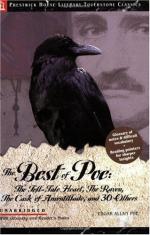found an echo in these:
“And the silken sad
uncertain rustling of each purple curtain
Thrilled me—filled
me with fantastic terrors never felt before.”
Here Poe assumed a privilege for which he roughly censured Longfellow, and which no one ever sought on his own premises without swift detection and chastisement. In melody and stanzaic form, we shall see that the two poems are not unlike, but in motive they are totally distinct. The generous poetess felt nothing but the true originality of the poet. “This vivid writing!” she exclaimed,—“this power which is felt!... Our great poet, Mr. Browning, author of ‘Paracelsus,’ &c., is enthusiastic in his admiration of the rhythm.” Mr. Ingram, after referring to “Lady Geraldine,” cleverly points out another source from which Poe may have caught an impulse. In 1843, Albert Pike, the half-Greek, half-frontiersman, poet of Arkansas, had printed in “The New Mirror,” for which Poe then was writing, some verses entitled “Isadore,” but since revised by the author and called “The Widowed Heart.” I select from Mr. Pike’s revision the following stanza, of which the main features correspond with the original version:
“Restless I pace our lonely rooms, I play our songs no more,
The garish sun shines flauntingly upon the unswept floor;
The mocking-bird still sits and sings, O melancholy strain!
For my heart is like an autumn-cloud that overflows with rain;
Thou art lost to me forever, Isadore!”
Here we have a prolonged measure, a similarity of refrain, and the introduction of a bird whose song enhances sorrow. There are other trails which may be followed by the curious; notably, a passage which Mr. Ingram selects from Poe’s final review of “Barnaby Rudge”:
“The raven, too, * * * might have been made, more than we now see it, a portion of the conception of the fantastic Barnaby. * * * Its character might have performed, in regard to that of the idiot, much the same part as does, in music, the accompaniment in respect to the air.”
Nevertheless, after pointing out these germs and resemblances, the value of this poem still is found in its originality. The progressive music, the scenic detail and contrasted light and shade,—above all, the spiritual passion of the nocturn, make it the work of an informing genius. As for the gruesome bird, he is unlike all the other ravens of his clan, from the “twa corbies” and “three ravens” of the balladists to Barnaby’s rumpled “Grip.” Here is no semblance of the cawing rook that haunts ancestral turrets and treads the field of heraldry; no boding phantom of which Tickell sang that, when,
“shrieking
at her window thrice,
The
raven flap’d his wing,
Too well the love-lorn maiden
knew
The
solemn boding sound.”




